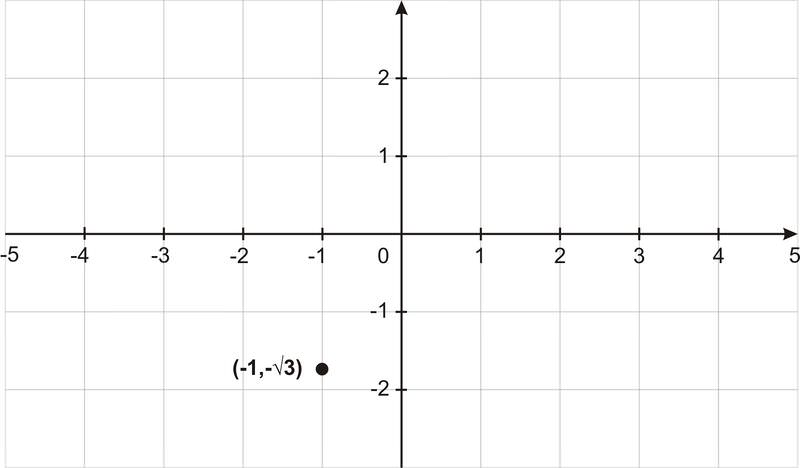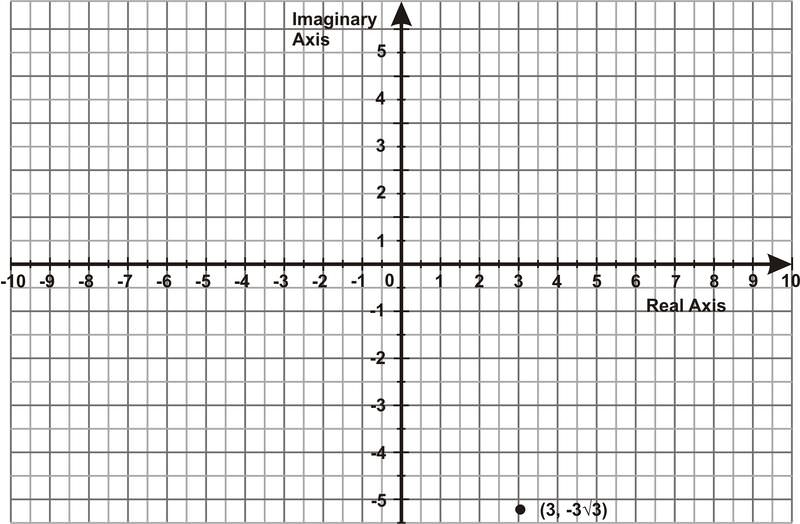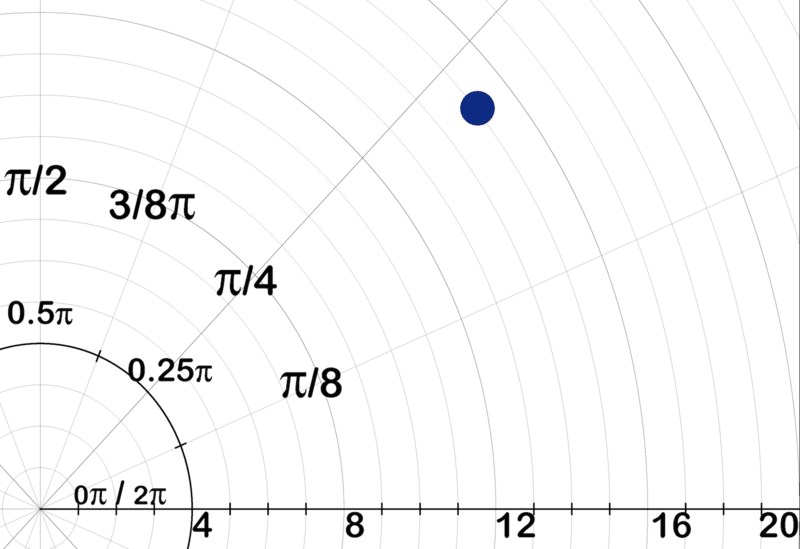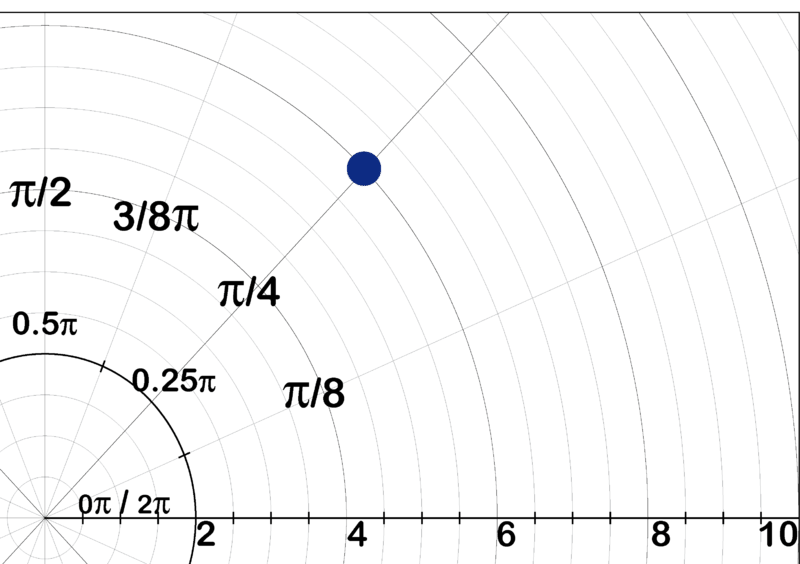复数极表
章节大纲
-
can be graphed on a polar graph just like real numbers can. You will discover during this lesson that there are actually a few different ways of doing this.
::可以在极地图上像真实数字一样图形化。 您将会在这个课程中发现, 实际上有几种不同的方法来做这个操作 。Polar Form of Complex Numbers
::复数极表You have learned that rectangular graphs can be put into polar form , and that points in rectangular coordinates can be plotted in the polar coordinate system. In this section you will learn how to do the same process with complex numbers.
::您已经学会了, 矩形图形可以以极形形式出现, 矩形坐标上的点可以在极地坐标系统中绘制。 在本节中, 您将学习如何使用复杂数字进行相同的进程 。There are three common forms of complex numbers that you will see when graphing:
::有三种常见的复杂数字形式,您在图形化时可以看到:-
In the standard form of:
z
=
a
+
bi
, a
complex number
z
can be graphed using rectangular coordinates (
a
,
b
). ‘a’ represents the
x
- coordinate, while ‘b’ represents the
y
- coordinate.
::标准格式为:z = a + bi, 复数 z 可使用矩形坐标(a, b) 绘制图表。 " a " 表示 x - 坐标,而 " b " 表示 y - 坐标。 -
The polar form:
which we explored in a previous lesson, can also be used to graph a complex number. Recall that you can use
x
and
y
to convert between rectangular and polar forms with:
and
. Unfortunately, there is a problem with using a conversion from
rectangular form
to polar form like:
::极形 : (r, ) , 我们在前一课中探讨过, 也可以用来绘制一个复数 。 回顾您可以使用 x 和 y 在矩形和极形之间转换 : r=x2+y2 和 tan refyx 。 不幸的是, 使用矩形转换为极形有问题, 比如 :
::a+bi___________________________________________________________________________________________________________________________________________________________________________________________________________________________________________________________________________________________________________________________________________________________or
::或
::-1-i3_______________________________________________________________________________________________________________________________________________________________________________________________________________The problem is that we have lost the i . So, in order to “keep track” of the imaginary part, we can use another form.
::问题是,我们失去了i。所以,为了“追踪”假想的部分,我们可以使用另一种形式。-
The third form is
trigonometric form
. It is often abbreviated as
rcisθ
, short for: z =
r
(
c
osθ +
is
inθ), and will be used quite often as you progress. This form comes from the substitutions:
x
=
r
θ
and
y
=
r
θ
.
::第三种形式是三角形。通常缩写为 rcis : rcis : z = r( cos + isin) , 并且随着您的进展, 将经常使用。 此形式来自替换 : x = r r = y = r = r 。
Using this fact, and sample values of for r and for θ , we can write
::使用这个事实, r 的样本值为 2 , r 的样本值为 #% 3 , 我们可以写入
::1 - i3=2 cs 43+2 I sin 43Finally, factoring the 2, we get:
::最后,考虑到2,我们得到:z=2(2cs 43+i sin 43)Summary of Forms
::形式摘要The complex number: , the rectangular point , the polar point: , and or all represent the same number.
::复数 : z1-3i, 矩形点 (-1-3), 极点 (2,43), 和 2( cos 43+i sin 43) 或 2 cis (43) , 均为相同数字 。Steps for Conversion
::转换步骤To convert from polar to rectangular form, the distance that the point (2, 2) is from the origin can be found by
::要从极向矩形转换成矩形,点(2,2)与源的距离可以由下列方式找到:or or
::d=x2+y2 或 22+22 d=8 或 22The reference angle (i.e. the corresponding angle in the first quadrant) that the line segment between the point and the origin can be found by
::点与源之间线段的参考角度(即第一个象度中相应的角),可按下列方式查找:
::现 现 年 日 年 年 年 年 年 年 年 年 年 年 年 年 年 年 年 年 年 年 年 年 年 年 年 年 年 年 年 年 年 年 年 年 年 年 年 年 年 年 年 年 年 年 年 年 年 年 年 年 年 年 年 年 年 年 年 年 年 年 年 年 年 年 年 年 年 年 年 年 年 年 年 年 年 年 年 年for z = 2 + 2 i ,
::z = 2 + 2i,
::皮肤 $2$22 $2$2$2$2$2$2$2$2$2$2$2$2$2$2$2$2$2$2$2$2$2$2$2$2$2$2$2$2$2$2$2$2$2$2$2$2$2$2$2$2$2$s
::棕色 ref= 1 。Since this point is in the first quadrant (both the x and y coordinate are positive) the angle must be 45 o or radians.
::由于此点位于第一个象限( x 和 y 坐标均为正) , 角度必须是 45 o 或 4 弧度 。It is also possible that when θ = 1 the angle can be in the third quadrant or radians. But this angle will not satisfy the conditions of the problem, since a third quadrant angle must have both and as negatives.
::当 = = = 1 时, 角度也可以在第三个象限或 5 4 弧度中。 但是, 这个角度无法满足问题的条件, 因为第三个象限角度必须同时有 x 和 y 的负值 。Note: When using , you should first consider, the quotient and find the first quadrant angle that satisfies this condition. This angle will be called the reference angle, denoted . Find the actual angle by analyzing which quadrant the angle must be given the x and y signs.
::注意 : 当使用 tan yx 时, 您应该首先考虑, 商数 , 并找到第一个满足此条件的象方角。 这个角度将被称为引用角 , 表示 ref 。 通过分析 x 和 y 符号必须给该角度的方位数来查找实际角度 。The complex number 2 + 2 i or (2, 2) in rectangular form has
::2+2i或(2,2,2)的矩形复合体有(22,%4)Examples
::实例Example 1
::例1Graph in polar form: .
::极形图:z1-i3。Here is what it looks like in the rectangular coordinate system:
::以下是矩形坐标系统中它的样子:In polar form, we find r with
::以极地的形式,我们发现R和R
::r=a2+b2and to find θ ,
::以发现,
::-1 -1 -1
::棕色 & erref= 3
::ref=tan-1 3
::瑞夫3号Since this angle is in the 4 th quadrant, .
::由于这个角度位于第四象限 43Example 2
::例2Find the polar coordinates that represent the complex number .
::查找代表复数z=3-333i的极坐标。a = 3 and b = : the rectangular coordinates of the point are .
::a = 3和b =-33:点的矩形坐标为(3,-33)。Now, draw a right triangle in standard form. Find the distance the point is from the origin and the angle the line segment that represents this distance makes with the +x axis:
::现在, 以标准格式绘制一个右三角形。 查找点与 +x 轴代表此距离的线段的起点和角之间的距离 :We know a = 3,
::我们知道a=3,b33
::r=32+(-33)2And for the angle,
::对于角度,
:- 333)3
::棕色 & erref= 3
::瑞夫3号But, since it is a 4 th quadrant angle
::但是,既然是第四象限角度The rectangular point is equivalent to the polar point .
::矩形点(3,-33i)相当于极点(6,53)。In rcisθ form, is .
::在cis形式中,(3,-33i)为6(53+i sin 53)。Example 3
::例3Convert the following complex numbers into polar form, use a TI-84 equivalent graphing calculator:
::将下列复杂数字转换成极形,使用TI-84等量图形计算计算器:-
::3- i 3- i -
::93+9i
On the TI-84: go to [ANGLE] (or [2nd] function) [APPS] . Scroll down to 5 or “R-Pr(“ and press [Enter] . Next, enter the rectangular coordinates and close the parenthesis. Press [Enter] , the “r” value appears. Scroll down to 6R-Pθ, and the polar angle appears in decimal radian form.
::在 TI-84 上: 转到 [ANGLE] (或 [第 2 函数) [APPS] 。 向下滚动到 5 或“ R- Pr () ” 或“ 按 [ Enter] 。 下一步, 输入矩形坐标并关闭括号 。 按 [ Enter] , “ r” 值将出现。 向下滚动到 6R- P , 极角以小数弧形式出现 。Note: Also under the [ANGLE] menu, commands 7 and 8 allow transformation from polar form to rectangular form.
::注:在[ANGLE]菜单下,指令7和8允许从极形转换成矩形。Example 4
::例4Plot the complex number .
::绘制复合号z=12+9i。-
What is needed in order to plot this point on the polar plane?
::在极地平面上划出这一点需要什么?
First, we will need to know and .
::首先,我们需要知道。-
How could the r-value be determined?
::如何确定r-价值?
The value is the hypotenuse of a triangle with two other sides, and . I t can be determined with the Pythagorean theorem: .
::热值是三角形与另外两面(A=12和B=9)的光值。 可以用Pythagorean定理:A2+B2=C2来测定。-
What is the r for this point?
::这一点有什么用?
The value for this point is .
::此点的值为 144+81_225=15。-
How could
be determined?
::如何确定 ?
can be calculated using either or .
::可以用 任何一种sin\\\\\915orcos\\\\\\\\\1215计算。-
What is
for this point?
::这一点是什么?
For this point, or .
::对于这一点,sin3537oorcos4537o。-
What would
look like on the polar plane?
::在极地平面上Z=12+9i会是什么样子?
looks like the image below when plotted on a polar plane.
::z=12+9i 绘制在极平面上时看起来像下面的图像 。Example 5
::例5What quadrant does occur in when graphed?
::当图表显示时, z3+2i 会出现什么象限 ?The point occurs 3 units to the left and 2 units up , placing it in Quadrant II.
::3+2occur 左侧3个单位, 左侧2个单位, 放置在 Quadrant II 中 。Example 6
::例6What are the coordinates of z = -3 + 2i in polar form and trigonometric form?
::Z = -3 + 2i 的极形和三角形坐标是多少?To identify the coordinates of in polar form and trigonometric form:
::确定 z3+2i 的极形和三角形坐标:First find
::r=(-32)+(22)_13Second, find
::第二,找到are the coordinates in polar form.
::[13,33.7o]是极形坐标。are the coordinates in form
::rcis13(______________________________________________________________________________________________________________________________________________________________________________________________________________________________________________________________________________________________________________________________________________________________________________________________________________________________________________________________________________________________________________________________________________________________________________________________________________________________________________________________________________________________________________________________________________________________________________________________________________________________________________________________________________________________________________________________________________________________________________________________________________________________________________________________________________________________________________________________________________________________________________________________________________________________________________________________________________________________Example 7
::例7What would be the polar coordinates of the point graphed below?
::下图显示的点的极地坐标是多少?The rectangular coordinates are (4.5, 3i) therefore the complex number would be
::矩形坐标为(4.5, 3i),因此复合号为z=4.5+3iUsing the Pythagorean Theorem as in Q #3
::r=5.4 使用Q #3中的毕达哥里定理Using as in Q #3
::33.75o 使用 sin=opopphyp如 Q # 3 中的 sin=opphyp 。is the point in polar form are the coordinates in form
::[5.4,33.65o] 是极形的点 rcis5.4(5) 是以 rcis 格式的坐标 。Review
::回顾Plot each complex number in the complex plane. Find its polar form, and give the argument in degrees.
::在复杂的平面中绘制每个复数。 查找其极形 [r, }] 并以度表示参数 。-
a)
b)
c)
:a) 1+一(b)一(c)一(1+一)(一)一
-
a)
b)
c)
:a)-2(b)-3i(c)-2(3i)
-
a)
b)
c)
:a) 1+一(b) 1-一(c) 1+一(一) 1-一(一)
-
a)
b)
c)
:a) 1+i3(b) 3-i c(1+i3)(3-i)
-
What are the rectangular coordinates for the point graphed below?
::下图点的矩形坐标是多少?
Compute and convert to form.
::计算并转换为 rcis 窗体。-
::--2-2-2-i-1-i -
::1+i6 1+i6 -
::32+12i10
Change to polar form.
::改变为极形 。-
::- 3-2i -
::23-2i 23-2ii
Change to rectangular form.
::更改为矩形。-
::15(cos120o+isin120o) -
::12(cos%3+isin%3) 3 -
For the complex number in standard form
find: a) Polar form b) Trigonometric form (Hint: Recall that
and
)
::标准表x+iy 查找的复数 : a) 极表 b) 三角度度表(提示: 提醒注意 x=rcos- 和 y=rsin )
Review (Answers)
::回顾(答复)Click to see the answer key or go to the Table of Contents and click on the Answer Key under the 'Other Versions' option.
::单击可查看答题键, 或转到目录中, 单击“ 其他版本” 选项下的答题键 。 -
In the standard form of:
z
=
a
+
bi
, a
complex number
z
can be graphed using rectangular coordinates (
a
,
b
). ‘a’ represents the
x
- coordinate, while ‘b’ represents the
y
- coordinate.




